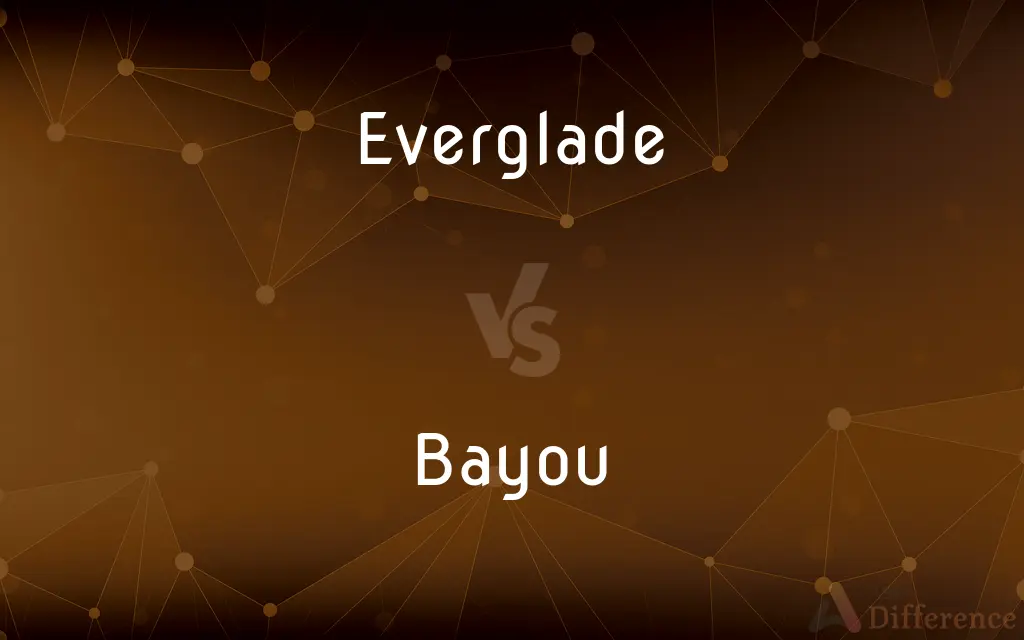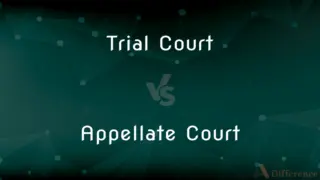Everglade vs. Bayou — What's the Difference?
By Tayyaba Rehman & Fiza Rafique — Updated on April 27, 2024
Everglades refer to a vast, shallow, slow-moving freshwater marsh in Florida, characterized by grassy wetlands, while bayous are slow-moving streams or wetlands, often associated with the Mississippi River region, characterized by their muddy waters.

Difference Between Everglade and Bayou
Table of Contents
ADVERTISEMENT
Key Differences
Everglades are primarily located in southern Florida and are known for their unique ecosystem that includes sawgrass marshes and mangrove forests. In contrast, bayous are found in the Gulf Coast region, particularly in Louisiana, and are noted for their meandering, slow-moving waters that often form from larger rivers or lakes.
The Everglades are a distinctive, wide expanse of wetland that supports a diverse range of wildlife, including endangered species like the American alligator and the Florida panther. On the other hand, bayous provide a critical habitat for aquatic species and are often surrounded by dense vegetation, making them a key feature of the southern landscape.
In terms of water flow, the Everglades are fed by a slow trickle of water from Lake Okeechobee, which is crucial for maintaining its ecosystem. Bayous, however, typically form at lower elevations, collecting runoff from higher land and flowing slowly due to their flat terrain.
The Everglades are a national park, attracting visitors for airboat tours, bird watching, and hiking. Conversely, bayous are often integral to local cultures, especially in Louisiana, where they are a vital part of the landscape for fishing, boating, and Cajun culture.
Conservation efforts in the Everglades focus on restoring natural water flow and controlling invasive species, crucial for preserving its unique ecosystem. Bayou conservation often involves erosion control, pollution reduction, and maintaining water quality to support their ecological functions.
ADVERTISEMENT
Comparison Chart
Location
Southern Florida
Gulf Coast, especially Louisiana
Ecosystem
Freshwater marshes, sawgrass, mangroves
Slow-moving or stagnant marshy streams
Wildlife
American alligators, Florida panther
Aquatic species, birds
Water Source
Slow trickle from Lake Okeechobee
Runoff from surrounding land
Recreational Use
Airboat tours, bird watching, hiking
Fishing, boating, cultural activities
Conservation Focus
Restoring water flow, invasive species control
Erosion control, pollution reduction
Compare with Definitions
Everglade
Characterized by vast, grassy, open marshes.
Visitors to the Everglades enjoy the vast expanses of sawgrass marshes.
Bayou
A slow-moving or stagnant body of water forming an offshoot of a river or lake.
The bayou was filled with water lilies and frogs.
Everglade
A large subtropical wetland in Florida with slow-moving water and diverse wildlife.
The Florida Everglades is home to numerous endangered species.
Bayou
Common in the southern United States, especially Louisiana.
Bayous are an iconic part of Louisiana's landscape.
Everglade
A national park aimed at preserving natural habitats.
Everglades National Park offers various activities to explore its natural beauty.
Bayou
Plays a significant role in local culture and recreation.
Bayou fishing trips are a popular pastime in the region.
Everglade
Subject to extensive restoration efforts to maintain ecological balance.
Restoration projects in the Everglades focus on improving water quality and flow.
Bayou
Often surrounded by rich, dense vegetation.
We kayaked through the bayou, surrounded by thick cypress trees.
Everglade
Known for its unique ecosystem and biodiversity.
The Everglades' ecosystem is vital for the survival of many native species.
Bayou
Conservation includes efforts to prevent pollution and habitat destruction.
Local groups are working to keep the bayou free from pollutants.
Everglade
A tract of marshland, usually under water and covered in places with tall grasses or sedges.
Bayou
In usage in the Southern United States, a bayou () is a body of water typically found in a flat, low-lying area, and may refer to an extremely slow-moving stream or river (often with a poorly defined shoreline), a marshy lake or wetland or a creek whose current reverses daily due to tides, and which contains brackish water highly conducive to fish life and plankton. Bayous are commonly found in the Gulf Coast region of the southern United States, especially in the Mississippi River Delta.
Everglade
A tract of marshland, especially one containing clumps of sawgrass and hammocks of vegetation
Bayou
A body of water, such as a creek or small river, that is a tributary of a larger body of water.
Everglade
A swamp or low tract of land inundated with water and interspersed with hummocks, or small islands, and patches of high grass; as, the everglades of Florida.
Bayou
A sluggish stream that meanders through lowlands, marshes, or plantation grounds.
Bayou
A slow-moving, often stagnant creek or river.
Bayou
A swamp; a marshy (stagnant) body of water.
Bayou
An inlet from the Gulf of Mexico, from a lake, or from a large river, sometimes sluggish, sometimes without perceptible movement except from tide and wind.
A dark slender thread of a bayou moves loiteringly northeastward into a swamp of huge cypresses.
Bayou
A swampy arm or slow-moving outlet of a lake (term used mainly in Mississippi and Louisiana)
Common Curiosities
What are the main threats to the Everglades and bayous?
Main threats include pollution, invasive species, and changes in water flow or levels, which can disrupt the natural ecosystems.
How do conservation efforts for the Everglades and bayous differ?
Conservation in the Everglades largely focuses on restoring natural water flow and removing invasive species, while in bayous, efforts typically concentrate on erosion control and maintaining water quality.
Can the Everglades be found outside Florida?
The Everglades are specific to southern Florida, characterized by their particular climate and geographical features.
What makes the Everglades unique compared to other wetlands?
The Everglades are unique due to their vast size, specific water flow systems from Lake Okeechobee, and the presence of both freshwater and saltwater environments creating a diverse habitat.
Why are bayous important to the ecosystem?
Bayous are crucial for maintaining aquatic biodiversity, supporting a variety of wildlife, and helping in flood management due to their capacity to store floodwaters.
How do changes in water quality affect the Everglades and bayous?
Poor water quality can lead to habitat degradation, affecting biodiversity and the health of both ecosystems.
What cultural significance do bayous hold?
Bayous hold substantial cultural significance, particularly in Louisiana, where they are part of the Cajun heritage and backdrop to many local legends and lifestyles.
How are the Everglades and bayous similar?
Both the Everglades and bayous are wetlands that provide critical habitats for diverse wildlife and play important roles in their respective ecosystems.
Are there recreational activities common to both the Everglades and bayous?
Both areas offer boating and wildlife viewing, but the specific activities and cultural contexts differ, with airboat tours being popular in the Everglades and fishing in bayous.
What role do the Everglades and bayous play in local economies?
They contribute significantly through tourism, recreational activities, and in some areas, fishing and resource extraction, impacting local economies differently.
Share Your Discovery

Previous Comparison
Helm vs. Helmet
Next Comparison
Authorization vs. AuthorityAuthor Spotlight
Written by
Tayyaba RehmanTayyaba Rehman is a distinguished writer, currently serving as a primary contributor to askdifference.com. As a researcher in semantics and etymology, Tayyaba's passion for the complexity of languages and their distinctions has found a perfect home on the platform. Tayyaba delves into the intricacies of language, distinguishing between commonly confused words and phrases, thereby providing clarity for readers worldwide.
Co-written by
Fiza RafiqueFiza Rafique is a skilled content writer at AskDifference.com, where she meticulously refines and enhances written pieces. Drawing from her vast editorial expertise, Fiza ensures clarity, accuracy, and precision in every article. Passionate about language, she continually seeks to elevate the quality of content for readers worldwide.
















































